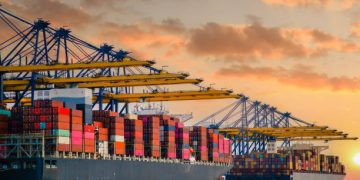By supplychainreport
American businesses are encouraging U.S. trade authorities to lower tariffs on Vietnamese goods, highlighting Vietnam’s growing role in supply chain diversification strategies adopted by global manufacturers.
The push comes as Vietnam’s trade surplus with the U.S. exceeded $125 billion last year, positioning it as one of the top surplus countries after China and Mexico. Several major U.S. companies—including Apple, Intel, and Nike—have shifted production to Vietnam, making it a key manufacturing hub in the Indo-Pacific.
In April, a proposed 46% tariff was placed on Vietnamese exports, among the highest following those for other major trading partners. While the measure was paused to allow for further trade discussions, U.S. firms with operations in Vietnam have expressed concerns about the potential economic impact should it proceed.
The American Chamber of Commerce in Hanoi, which represents U.S.-affiliated businesses in Vietnam, emphasized the importance of maintaining a balanced trade relationship. In a letter to both U.S. and Vietnamese officials, the Chamber noted Vietnam’s strategic significance in supply chain diversification efforts and urged against tariff policies that could disrupt these developments.
“Vietnam has emerged as a valued partner of the United States in the context of diversifying supply chains,” the letter stated. It added that the growing U.S. trade deficit with Vietnam should be seen as a reflection of policy outcomes supporting regional economic realignment, rather than grounds for punitive measures.
Higher tariffs, the Chamber warned, could negatively affect U.S. companies operating in Vietnam, as well as consumers and bilateral commercial ties. For example, Nike, which produces half its footwear in Vietnam, is reportedly planning price increases in response to potential tariff impacts. Analysts also expect Apple to source nearly two-thirds of its AirPods from Vietnam by the end of this year.
Trade negotiations are ongoing, with both sides expected to reconvene in mid-June. Vietnamese officials have expressed commitment to addressing key U.S. concerns, including enhanced oversight of customs practices and increased purchases of American goods such as aircraft, energy products, and equipment.
In addition, Vietnam has approved several high-profile U.S. investments and has pledged to lower non-tariff barriers in certain sectors. The American Chamber has recommended further reforms, including the liberalization of Vietnam’s power sector, which could stimulate imports of U.S. technologies and services.
U.S. trade authorities have also flagged issues related to trans-shipment, where goods from third countries may be re-exported through Vietnam. Both governments are reportedly exploring enhanced customs cooperation to address such concerns.
Despite ongoing discussions, recent trade data shows Vietnam’s exports to the U.S. continue to rise. The American business community hopes that sustained dialogue will help advance a mutually beneficial and stable trade environment.
#SupplyChainNews #TariffUpdate #VietnamTrade #USVietnamRelations #GlobalManufacturing















